
Low-observable Kaori-X UAB being developed by the ADD [Courtesy of ADD]
The defense ministry's announcement was made about three months after the airspace of Seoul and its northern satellite cities were breached by a handful of North Korean drones on December 26, 2022. The Joint Chief of Staff said one of the drones flew across the northern region of Seoul for about an hour. The defense ministry admitted on January 5 that Seoul's airspace was breached by North Korean drones.
When North Korean drones were detected, the South Korean Air Force scrambled fighter jets including F-15K and KA-1 fighter jets. The Army also deployed attack helicopters such as AH-64, also known by its nickname "Apache," and AH-1 "Cobra" in an effort to intercept the unmanned aerial vehicles (UAVs), but South Korean warbirds could not shoot down the North Korean drones because they could cause collateral damage when they crash into populated areas.
According to the defense ministry on March 8, the drone operations command headquarters, scheduled to be established in the latter half of 2023, will preferentially focus on the distribution of South Korea's operational airspace for UAVs. Currently, the airspace is allocated for fixed-wing planes, helicopters, artillery forces, and other aerial vehicles.
The new drone command will benchmark other countries which manage military drones. Turkey is one of the few countries with strong drone operational capabilities. The country developed and operates Bayraktar TB2, a medium-altitude long-endurance unmanned combat aerial vehicle that is remotely controlled to provide air-to-ground attack missile support for ground troops. TB2 can also be armed with laser-guided bombs and missiles.
According to military officials, a South Korean military officer team had recently visited Turkey's drone operations division to share know-how about the operation and management of drones. "We are developing our operational concept and strategies by analyzing operation examples of other countries," JCS said.
Copyright ⓒ Aju Press All rights reserved.




